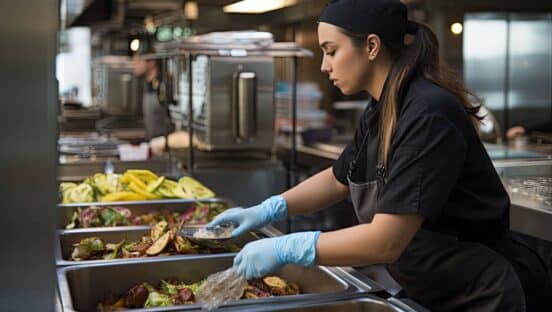The restaurant industry is known for its long hours, high operating costs and tight margins. Running an efficient operation is crucial to success, with the understanding that any and all wasteful practices are like a sieve draining profits from the business.
Perhaps the chief contributor to waste is food. According to the National Restaurant Association, between 4 and 10 percent of all restaurant food is wasted before it reaches the consumer. Even for a moderately sized business, this represents tens of thousands of dollars in direct costs, not to mention all the ancillary expenses tied to labor, storage, disposal and other aspects of delivery and processing.
Fast Wasted Food
The problem is even more acute in the quick-service and fast-casual dining sectors, which require fast turnaround of customer orders in environments that often see rapid and dramatic demand fluctuations. This leads many organizations to prioritize meal delivery over efficient preparation.
At the same time, most business models built around rapid service rely on plastic containers, dishes and utensils—primarily because they are readily available at low price points. But this can be deceiving because the true cost of plastics not only impacts the restaurant’s bottom line but manifests itself across all layers of the economy, particularly in municipal budgets and healthcare costs.
A recent report by the United Nations Environment Programme (UNEP) estimated that more than 430 billion tons of plastic are produced each year, with two-thirds of it thrown away after just one use. Not only is plastic pollution encroaching on our coastlines and communities, it is making its way into the food chain where it impacts the health of plants and animals, including us.
Twin Solution
But what if there was a way to address food waste while simultaneously building brand value?
For many businesses, the answer lies in compostable packaging.
Made entirely from plant-based materials that revert back to healthy soil in a commercial composting facility, compostable packaging offers the foodservice industry a sustainable solution to today’s mounting environmental and public health concerns.
What’s more, multiple studies have shown that the use of compostables in food packaging is highly desired by consumers. Not only are people more willing to patronize business that they view as environmentally responsible, but they perceive the food itself to be of higher quality, and thus worth more, when presented in compostable materials like bamboo. At the same time, compostables are more amenable to a circular business model in which waste is not merely disposed of but returned to its source—the soil—where compost can ultimately improve farm yields, lower water consumption and reduce costs across the board.
Getting Started
The challenge, however, is creating the mechanisms that allow restaurants to partner across their value chain to execute a truly zero waste operation that composts organic material. To do this, restaurant owners need to take a few crucial steps:
- Conduct an SKU audit to identify how much plastic they are using, pinpoint opportunities for efficiency, and see what items can be replaced with compostables. Establishing a fully compostable suite of packaging front-of-house dramatically reduces the risk of contamination from single-use plastic and other contaminants.
- Next, connect with their local composting facility to understand their specific packaging requirements.
- Establish a composting program with knowledgeable providers, including a packaging partner who can provide suitable materials and printing services to educate customers on the benefits of composting. And don’t forget clear, streamlined signage across all bins.
- Train staffers and customers on the organization’s sustainability goals and composting initiative and how they are personally contributing to its success. Every person can be a Zero Waste Ambassador!
- Remember that sustainability is a journey. Start the composting program back-of-house and once the organization has consistently maintained a clean stream and can confirm a fully compostable suite of packaging, expand the program to customers by offering front-of-house composting.
- Review the program regularly, with input from consumers, staff and partners to assess performance and identify opportunities for further optimization. Particular attention should be paid to removing the source of any contaminants entering the chain.
This level of planning and guidance will help ensure a successful and sustaining composting program that engages a restaurant’s customers and employees, ultimately building brand value and loyalty.
The simple fact that the composting industry is vibrant and growing, and that today’s consumers are demanding sustainable solutions, proves that compostables as part of a broader zero waste approach serves both an ecological and economic need. For any business, the opportunity to reduce costs, boost profits and contribute to greater social well-being should be a welcome addition to the business model.
Savannah Seydel is an environmental advocate and Vice President of Sustainability for Better Earth, a compostable foodservice packaging company on a mission to make sustainability accessible and regenerative circularity achievable across the foodservice industry.













